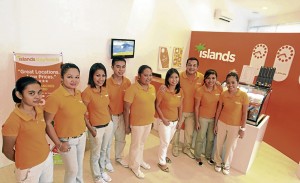Inquirer Visayas
12:42 am | Sunday, August 28th, 2011
 |
| JAY Aldeguer, president and CEO Islands Stay Hotels. CDN PHOTO/TONEE DESPOJO |
CEBU CITY – Nineteen years ago, Jay Aldeguer set up a T-shirt business, Islands Souvenirs, with an initial capital of P200,000, and his venture has gone a long way since then.
Today, Aldeguer has invested into another tourism-related venture, Islands Stay Hotels (ISH), a value-chic hotel chain that would tap the market for no-frills accommodation. He has poured in about P35 million.
“It’s a similar concept to low-cost airlines finding that meals on the plane are one of the more practical things to do away with, in turn, passing the savings to the customer,” says Aldeguer, chief executive officer of the Islands Group.
The hotel project is in the group’s five-year plan to boost the country’s tourism industry.
Aldeguer sees a demand for ISH as accommodations in Cebu are either the luxury and business hotels, or the lower-end inns and pension houses.
It has two branches – one just across from the Cebu Business Park on Archbishop Reyes and the second along Marina Mall near the Mactan Cebu International Airport.
The Archbishop Reyes branch has 15 rooms while the Mactan branch has 20, but Aldeguer plans to increase the number to 50 and 60, respectively. The target is actually 300 rooms in the next two years.
For Cebu alone, Aldeguer says ISH target 10 locations in the next 10 years.
Lower
Although priced lower than most hotels and resorts, the rooms in the centrally located ISH outlets offer quality beds and linens, rain showers, flat screen TV sets and free wireless broadband access.
Aldeguer may be on the right track. During their dry runs, the two hotels registered an 85 percent average occupancy rate and a walk-in rate of 50 percent, which, he says, was well beyond industry standards.
Islands Stay Hotels rooms are categorized as small, medium, large and extra large.
For its uptown Cebu branch the rates are P950 for small; P1,450 for medium; P1,950 for large and P2,150 for extra large.For its Mactan branch, the room rates are P850 (starting September) for small, a promo rate of P950 for medium for one person and additional P500 and P300 for each succeeding extra person and P1,650 for large.
Filling the gaps
 |
| JAY ALDEGUER, president and CEO Islands Stay Hotels (3rd from right) and his staff of Islands Stay Hotels Cebu City. CDN PHOTO/TONEE DESPOJO |
Islands Souvenir now has 90 outlets, including stand-alone stores, department stores and those run by distributors, spread all over the Philippines.
While it has become a success, Aldeguer has found himself deeper in the tourism industry, noting gaps, especially in tourism services, that should be addressed. He considers the gaps as business opportunities and must be filled so the Philippines can become a premier destination in the Asia-Pacific region.
Islands & More
In 2006, Aldeguer established Islands & More, a retail business catering to tourists and with shops located in hotels and airport terminals. The concept revolves around a one-stop, travel essentials store offering products minus the high mark-ups common in hotels and resorts.
Islands & More now has 12 stores and three franchise areas – Baguio City, City of Vigan in Ilocos Sur, and Camarines Sur.
Islands Banca Cruises
Two years later, he invested in Islands Banca Cruises (IBC), which addresses the question of what else to do in Cebu aside from going to the beach or on historical tours. His initial capital was at P3 million, while his total investment has reached P5 million.
Just like Islands Souvenirs, IBC helped set the standards for boats offering island hopping tours. Other boats had been confronted with safety issues as these were not being regulated by the government.
During peak season, IBC and its fleet of 12 bancas could not accommodate all their clients, so the company decided to enter into arrangements with other boat owners.
“We fix their boats, have our own crew man these. During the peak season, we outsource eight to 10 boats,” Aldeguer says. The boat owners get a share of the revenues.
IBC has become successful that other businesses offering similar services have emerged. Aldeguer now wants IBC to be replicated in other areas, such as Boracay and Bohol. “We are looking for strategic partners,” he says.
Market needs
Just recently, IBC signed a franchise agreement in Davao with Sea-T Leisure Group of Kirby Te, Aldeguer reveals.
Apart from island-hopping, the company will be offering another product – a romantic cruise at the Cebu-Mactan channel.
The unstoppable Aldeguer has yet set his sights on another tourism-related business, Talima Adventure and Waterpark, on Olango Island in Lapu-Lapu City.
“I wanted to develop a new destination in Cebu,” he says. He places his investment in Talima at P8 million to P10 million.
The place features a giant inflatable slide, water trampolines and water rollers. A greater part of the P100 entrance fee per visitor is donated to the Talima Marine Sanctuary.
Talima had projected a turnout of 150 people on a weekend, but on the next, it drew 500. Bad weather, though, had forced the cancellation of trips to Olango.
For those interested in going into a tourism-related business, Aldeguer shares this advice: “Now is the good time to go into business because we are at the crossroads, where there are so many new demands and needs in travel. Whoever recognizes that will be in good company.”







